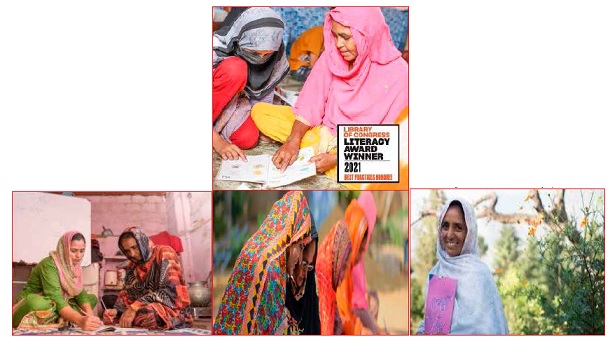Pakistani Literacy Program Recognized by Library of Congress
By David Gardner and Amjad Noorani

The Citizens Foundation, a non-profit that runs equal-opportunity schools for underprivileged children in Pakistan’s poorest urban and rural communities, has been honored by the Library of Congress for its outstanding contributions to increasing literacy. TCF’s Adult Literacy Program—‘Aagahi’ (meaning ‘awareness’ in Urdu)—was recently selected as a 2021 Best Practice Honoree in the prestigious Library of Congress Literacy Awards. Since 2013, the Library of Congress Literacy Awards Program has awarded over $2 million in prizes to 136 institutions in 36 countries.
The Citizens Foundation was one of just 14 honorees this year from around the world. The winner of the 2021 Library of Congress David M. Rubenstein Prize was Dolly Parton’s Imagination Library that gifts books to children five-years-old and younger.
While TCF's primary focus is providing K-10 quality education for underprivileged girls and boys in Pakistan, the non-profit is playing a huge role in transforming many adult lives as well through its Adult Literacy Program. The award-winning Aagahi program is a community-based, four-month curriculum teaching functional numeracy and literacy skills – including learning modules for life skills to enable reading the newspaper, reading and writing simple notes and letters, filling in a form, opening and maintaining a bank account, basic arithmetic for household expenses and budgeting, paying bills, reading and sending messages on Smartphones, and other essentials. The program targets women and young girls – mothers, grandmothers, sisters, and daughters who missed out altogether on going to school or dropped out of school either to help with chores at home or go to work as a child to help pay the family's bills.

Since its inception in 2005, over 150,000 women have completed the Aagahi program and now have the capability to make more independent and informed decisions and be more involved in their children's education and progress in school. In 2017, Aagahi was awarded the UNESCO Confucius Prize for Literacy. TCF is also featured in a case study “Best Practices in Girls’ Enrollment in Pakistan” by the UN Girls Education Initiative (UNGEI).
Women are nearly half of Pakistan's 220 million population. According to a 2018-19 survey, only 50% of Pakistani women and girls 10 years or older have attended school or are able to read and write in any language. Low literacy levels are a key barrier to women's participation in skilled jobs, and why most women are limited to low-paying work as rural farm laborers or domestic helpers in urbanized areas. Aagahi has evolved as a pathway especially for women from disadvantaged communities—and for out-of-school girls—to learn to read and write. The classes are held twice weekly in the evenings either at TCF schools or at independent learning centers in homes or other locations in the community.
The women and younger girls are taught to read and write in the local language, typically Urdu, plus basic math skills and reading and writing of alphabets and simple words in English. The curriculum utilizes workbooks to learn phonetics-based recognition of alphabets, words and sentences, and a book to learn basic numeracy. Financial literacy modules have been added to the curriculum. Topics on personal health, hygiene, and sanitation are also covered including prevention of common ailments (malaria, diarrhea, etc.), and the importance of a clean environment.
TCF partners with the Literate Pakistan Foundation to acquire learning materials and training for Aagahi instructors and is planning to extend the program to other school sites and communities as well as industrial worksites. Aagahi was also piloted at a worksite for factory workers at a textile plant. It currently runs a total of 1,687 schools including more than 350 adopted public schools in partnership with provincial governments. Present enrollment is 275,000 students with nearly 50% gender parity. All TCF schools are in underserved and challenged communities and are staffed with an all-women teaching faculty to boost enrollment and retention of girls in schools. TCF employs 13,000 teachers and principals. It is also the largest private employer of women in the country. In addition to the teachers and school principals, many more women work in TCF departments involving strategic planning, academics, quality assurance, monitoring and evaluation of teachers, curriculum development, marketing, and school management.
Through generous donor funding of scholarships for college and university education, more than a thousand TCF alumni girls and boys have opted for higher education to become professional teachers, engineers, physicians, lawyers, media professionals, health professionals, or to pursue other careers. Some have even joined the civil service, police force, and defense services. Remarkably, a TCF alum has recently enrolled in a masters’ and doctorate program at a US university and other applicants are following suit.
- (David Gardener is a writer, media and public relations specialist. Amjad Noorani is an activist for education reform in Pakistan and author of Agents of Change.)

